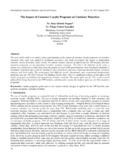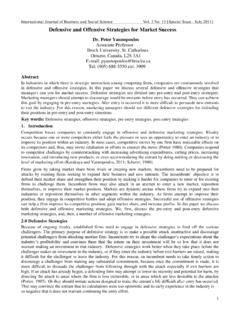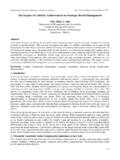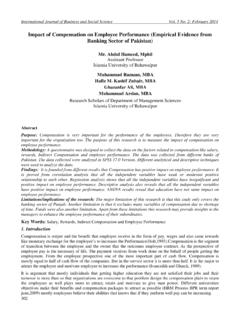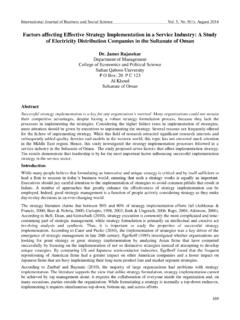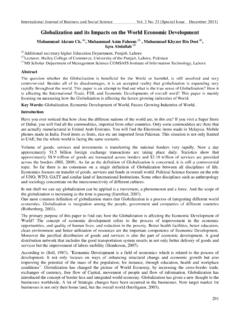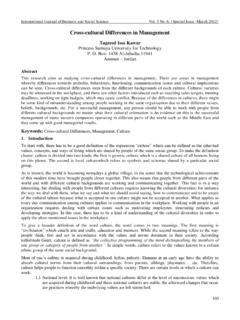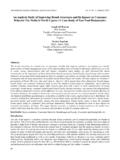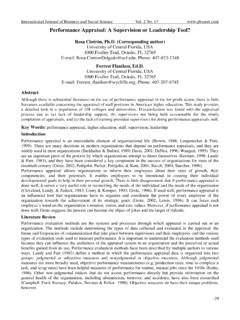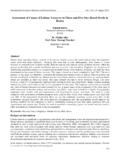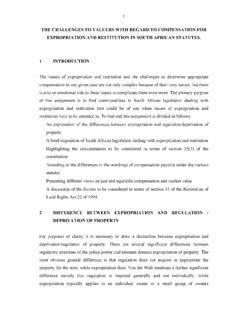Transcription of The Debates and Impact of Sanctions: The Zimbabwean …
1 International Journal of Business and Social Science Vol. 3 No. 5; March 2012. The Debates and Impact of sanctions : The Zimbabwean experience Mediel Hove (Mr.). Lecturer War & Strategic Studies Unit Department of History University of Zimbabwe. Zimbabwe. Abstract This study evaluates the Impact of the sanctions which were imposed on the Zimbabwean leadership in the new millennium in pursuit of human security and good governance. Using primary and secondary sources it argues that the imposed sanctions caused more harm than good and hence achieved the opposite of what they were designed to accomplish. Despite the debate generated on whether the sanctions are targeted or not the paper asserts that these sanctions further endangered provision of services as leaders neglected service delivery due to the imposition of sanctions which they dubbed an anti-Land Reform Programme strategy.
2 The presentation further asserts that several sectors deteriorated; risking the lives of many Zimbabweans as water supply, education and health delivery systems collapsed. Therefore sanctions served to aggravate the welfare of ordinary Zimbabweans with very little achievement on the objectives of the embargo. Instead of registering improvements, sanctions soured relations between Zimbabwe and the west. Mediators should therefore seek to harmonise relations amongst Zimbabweans, Zimbabweans and other nations through the strategy of engagement. It is my submission that, where sanctions are imposed, it should be after a deeper scrutiny on their wider short and long term repercussions on the ordinary powerless citizens of the targeted country.
3 One may find it fruitful and humane if great players in diplomacy search for flexible strategies of engagement rather than rely on rift widening tactics like sanctions which Impact negatively on vital service providing systems such as health, education, water and sanitation. Key Words: sanctions , water, health, education, service delivery, Government of National Unity. Introduction Over the years countries accused for violating human rights had sanctions in their different forms imposed on them. In their diverse packages sanctions are a penalty imposed to ensure compliance with the law. In human history economic sanctions have been used in response to international crisis, as an alternative to the use of armed force for instance; Napoleon Bonaparte almost brought Britain to her knees through his famous continental system had the British not responded with counter-measures guided by the Orders in Council (Thomson 1969: 43- 8).
4 A couple of decades later nation states used this strategy under the emblem of the United Nations (UN) charter as a peaceful means to settle disputes. For example in the sixties sanctions were imposed on Rhodesia for flouting human rights. The major goal of sanctions is to punish the rule breaker so as to prevent him from attaining his objectives and aim to change the rule breaker s policy. More-so sanctions are designed to safeguard economic interests of the imposer. For over a decade, Zimbabwe has been under economic sanctions imposed by the European Union (EU), the United States of America (USA) and Australia accusing the government of human rights violations.
5 The EU and US consider the sanctions as targeted restrictive measures on President Mugabe and officials who support his rule. On the other hand, ZANU (PF) views these sanctions as targeting the whole nation and for that matter an anti- Land Reform Programme strategy. This presentation briefly discusses the history of sanctions , disputations which have been generated by the sanctions imposed on Zimbabwe and outlines the sanctions road map. Furthermore, it unveils the suffering caused by sanctions as education, water and the health delivery systems collapsed. The argument being that targeted or not, sanctions had far reaching consequences since for over a decade ruined service delivery to Zimbabweans.
6 Therefore in light of the damaging effect of the sanctions parties to the conflict should be encouraged to embark on a regulated removal road map attached to the six issues in the Global Political Agreement (GPA) such as the creation of a reliable voters roll, transparent handling of the emotive land issue and media reforms. It is high time for the US, EU and Australia to realize that the sanctions had and are still inflicting devastating effects not only on the targeted few but on the poor majority Zimbabweans. 72. Centre for Promoting Ideas, USA sanctions : History sanctions are an instrument accessible to the Security Council acting under Chapter VII of the United Nations Charter in the event of any threat to the peace, breach of the peace or act of aggression.
7 They were employed two times during the Bi-polar system from 1945 to 1990, against Rhodesia (1968) and then South Africa (1977). The use of sanctions amplified since the break-up of the Union of Soviet Socialist Republics and the end of the bipolar system between East-West in international relations in 1991. It would be befitting to refer to the post Cold War era as the sanctions era. Several sanction regimes were adopted by the Security Council from 1990 to the present. sanctions were imposed against; Iraq (1990), the former Yugoslavia (1991), the Federal Republic of Yugoslavia (1992), Libya (1992), Somalia (1992), Haiti (1993), UNITA (1993), Rwanda (1994), Liberia (1994), the Bosnian Serbs (1994), Sudan (1996), Sierra Leone (1997), the Federal Republic of Yugoslavia (1998), the Taliban (1999), Eritrea and Ethiopia (2000), Zimbabwe (1998), Iran (1979), Libya (2011), Syria (2011) and Iran (2012).
8 The sanctions against Iraq, were in force for over a decade. Even if humanitarian exemptions (the oil-for-food program) were gradually widened, the sanctions were at the heart of the debate for several years, especially their use and who they affected. It is the example of Iraq which allowed the international community to appreciate the political and, above all, the humanitarian problems that the imposition of sanctions raise, whether targeted or not. The sanctions imposed on Zimbabwe like those imposed on Iraq, threatened and are still harming institutions which are vital fur the survival, sustenance and continuity of human security of the poor majority.
9 Why Resort to sanctions : The Zimbabwean experience The use of economic sanctions to force an opponent to abide by the law is not a new phenomenon in documented history. A lot has been written articulating the reasons which led to the imposition of sanctions and their effects. There are three broad options which are used to respond to international crisis. They include doing nothing, considering taking military action and to seek to impose economic sanctions (Renwick 1981: 2). Any of these three options are employed to cause pain on the offending country. Economic sanctions are designed to punish the rule violator and to safeguard the economic interests of the imposer (Miyagawa 1992: 9).
10 sanctions may be introduced as a strategy of deterring states from wrongdoing in order to implement collective security. In support of this view Joseph Kurebwa observed that a delinquent state threatens international security either through acts of aggression or by creating domestic conditions that are conducive for international anarchy (Kurebwa 2000: 3). sanctions are considered a better alternative than military compulsion or force. sanctions were imposed on Zimbabwe then Rhodesia in the sixties after she was accused of infringing human rights. Instead of alleviating the plight of the people whose rights were violated, the sanctions led to the deterioration of the situation they were meant to alleviate (Strack 1979: 44).
